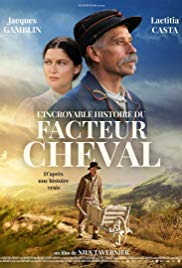
THE IDEAL PALACE/ L’INCROYABLE HISTOIRE DU FACTEUR CHEVAL.
France, 2018, 105 minutes, Colour.
Jacques Gamblin, Laetitia Custer, Lilly Rose Debos, Florence Thomassin, Bernard Le Coq, Natacha Lindinger, Louka Petir Taborelli.
Directed by Nils Tavernier.
While the English title focuses on the Palace that the postman, Cheval, built over a period of 30 years or more, the French title focuses on the postman himself and the fact that his story was rather incredible. Jacques Gamblin gives an impressive performance as the postman, from his middle aged to his old age,
The postman was a solitary man, walking his postal route every day around the countryside. He married, had a child. But, later married a devoted woman who bore him children. Sadly, his daughter, Alice, died young and he conceived the idea of building a memorial for her. On his daily trek, he picked up a variety of stones, putting them in his pocket, carrying them by hand, eventually in a wheelbarrow, and day by day, night by night, he built an extraordinary edifice, a mixture of all kinds of styles and influences, although he lived a simple life and was not well educated.
This is the story of his continued building, his devotion to his family, the death of his wife, his grief at the death of his daughter, the continued quest. And, he outlived his family, dying in 1924.
For many audiences, especially those from outside France, this story has to be seen to be believed, quite incredible in Cheval’s literally monumental achievement.
1. A film based on a true story and characters? The credibility of the plot, the postman, is decades of building his palace?
2. A warm film of humanity, the isolated personality of the postman, his mellowing and relationships, yet reserve, his building and its motivation? Philomena and her love for her husband? Their daughter? His building the palace for her? The response of the village, suspicions turning into pride?
3. The French countryside, the village, the homes, the streets, offices? The postman and his route, so many kilometres into the countryside and mountains? The changing seasons? The musical score?
4. The indications of the period, from 1873, into the 1880s, into the 20th century, the time of World War I, the aftermath, the death of cheval?
5. Jacques Gamblin and his performance, younger, ageing, old man? His reserve, going on his rounds, the official at the post office? His reticence? Philomena and her talking to him, the water, the sudden development in the screenplay, then marriage, her pregnancy, the birth of Alice?
6. Philomena and her personality, bright, widow, friendly with cheval, the marriage, her pregnancy enjoy, her relationship with her husband? Her love for him? The birth of their daughter, the happy years with the family? His touches of mellowing?
7. Philomena and her friends, the dressmaker, confidant? Felicity and her criticisms? The funeral, the parish in 1870s, the role of the priest? Cheval and his not exhibiting his grief? The reaction of the townspeople?
8. Cheval and the magazines, looking at the temples in Mexico, in Cambodia? The decision to build his palace? At night after his rounds? Collecting the stones, using his own inventiveness, metal frames to secure the stones in heights? The design, seeming haphazard, the models from the photos?
9. 33 years on building the palace? Alice and her delight in hiding in the grotto, playing with her father? His devotion to her? Philomena and her watching? The gradual development?
10. Alice, her joy, meeting the journalist and the guided tour? Her illness, collapse, her death, the funeral? Her father’s despair, falling into the water and thrashing? Philomena is supporting him?
11. The continued building of the palace, people coming to see it, his being awarded the medal for 30 years of Postal Service, the return of his son, the reticence between them? His son going to Paris, his course in tailoring, his return with his wife and daughters, the younger daughter called after Alice? The children’s delight in the palace?
12. His son, bringing a photographer, Cheval’s reticence, Philomena encouraging him, entering into the photos, the wide range of poses, the postcards? His reputation growing, his son keeping the box of articles and scrapbook?
13. His continuing his rounds, keeping fit, surviving? Philomena and her illness, his Frank telling her that she would die?
14. Intimations of the passing of time, the reference to the Dreyfus case in the end of the 19th century? The outbreak of World War I? The aftermath?
15. His granddaughter coming, wanting the wedding at the palace, the invitation? His sitting at the table, the dancing and joy, the lights on the palace?
16. His quiet death, aged 88? A simple man but his achievement?
17. The credits information about the building, its preservation, national heritage, tourists and visitors? An achievement?